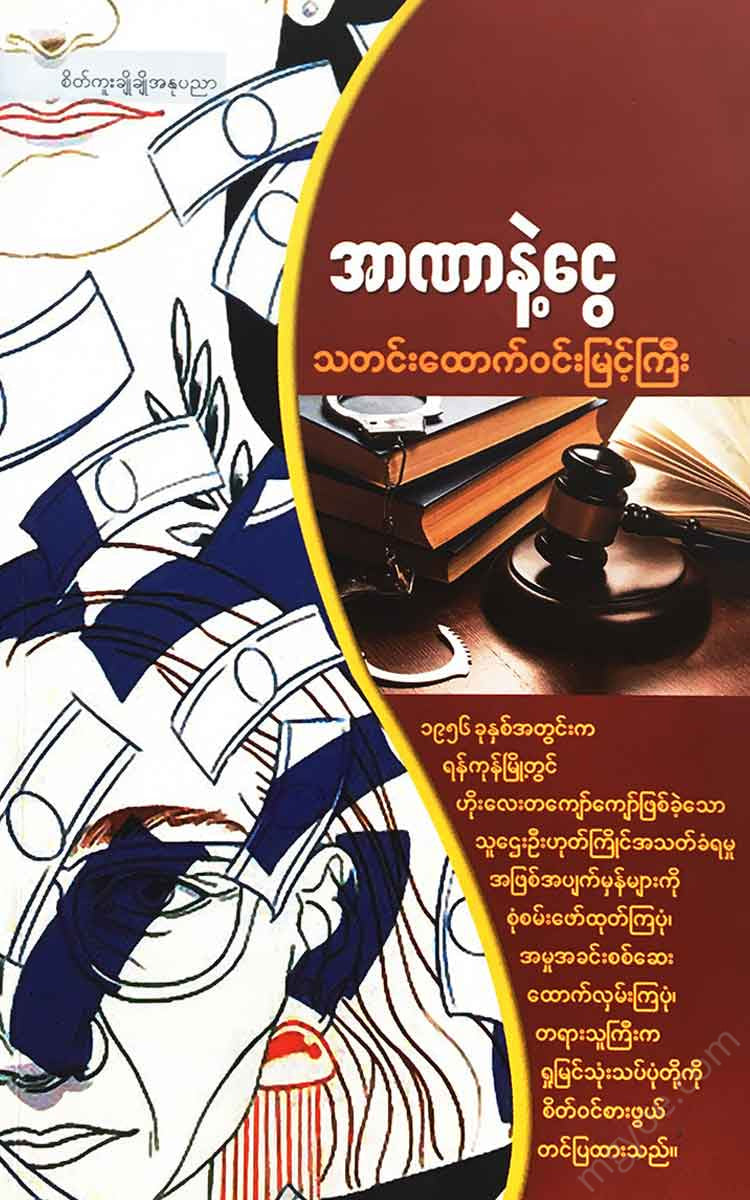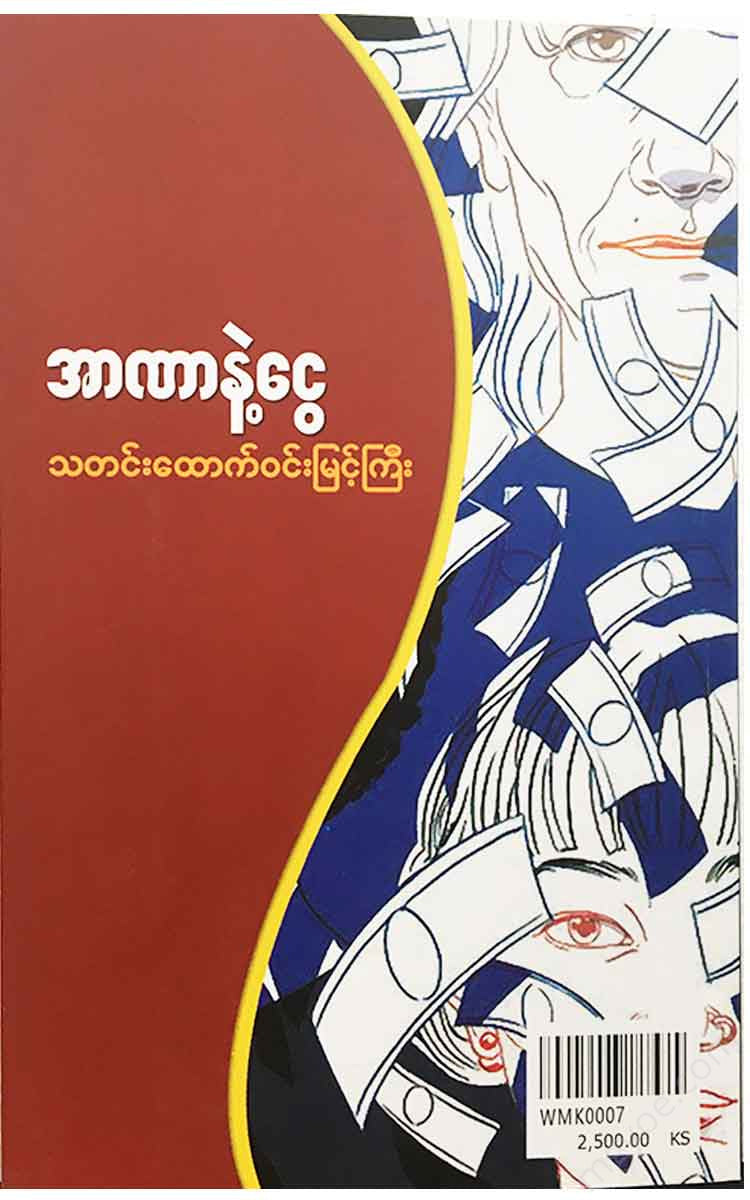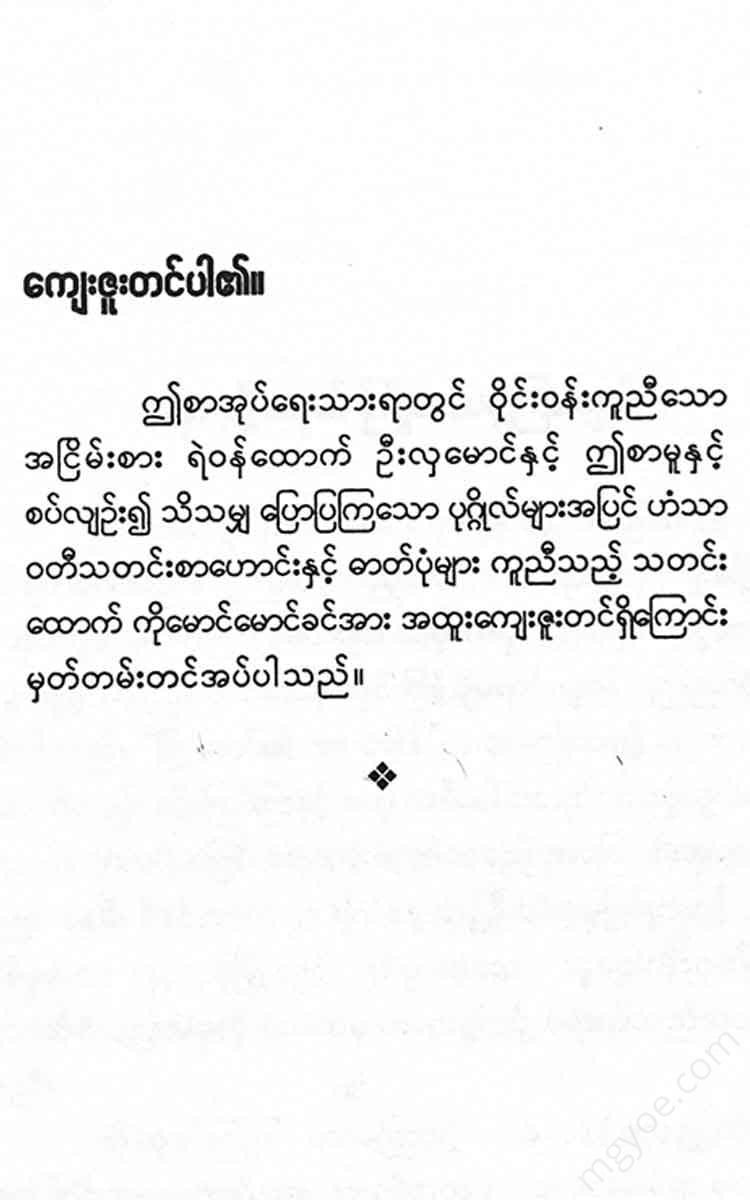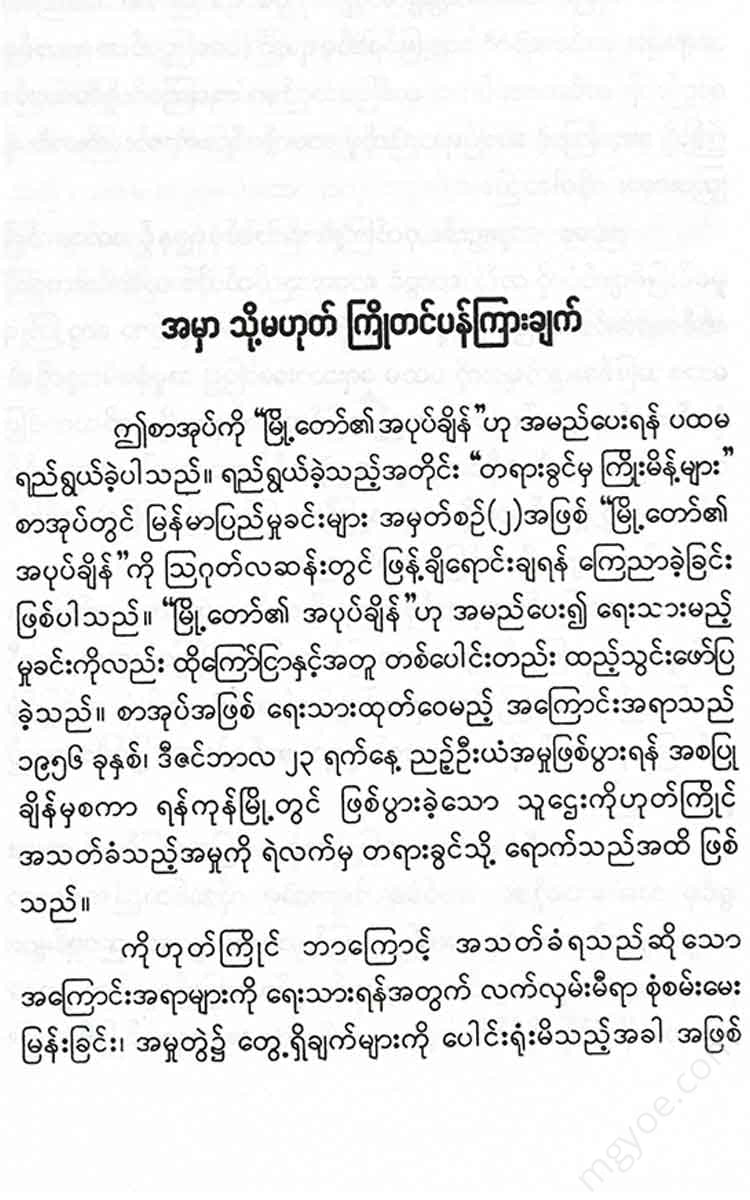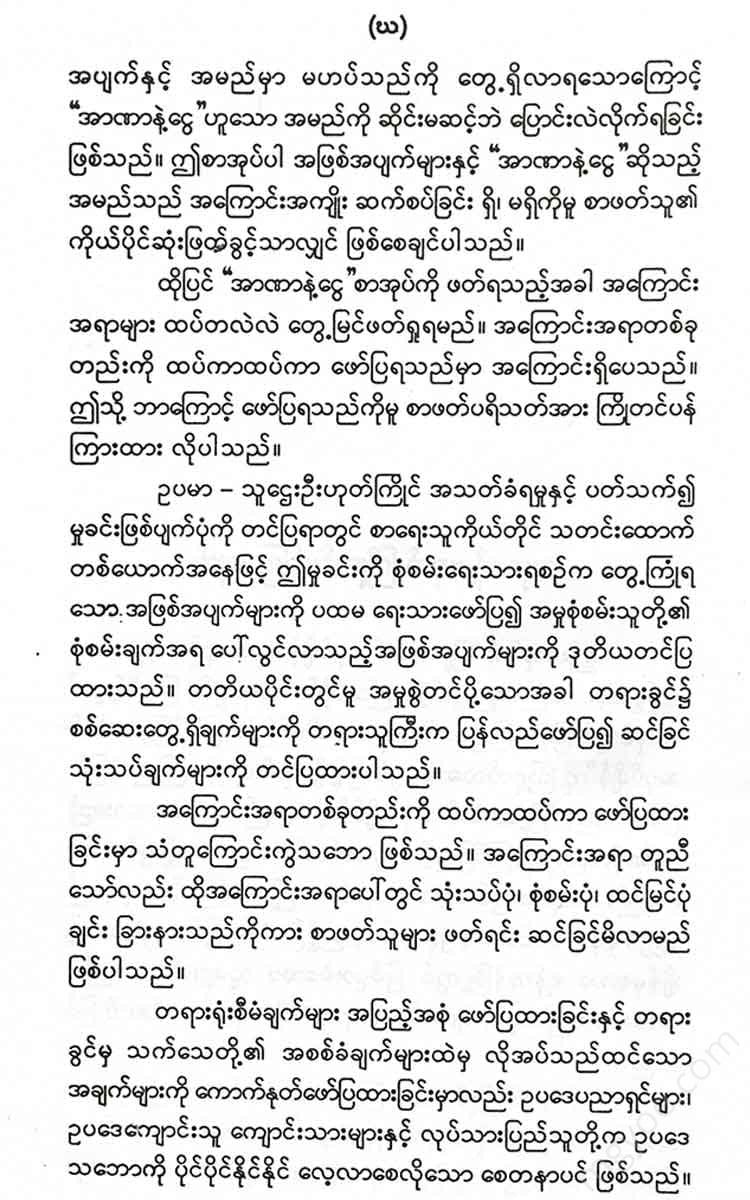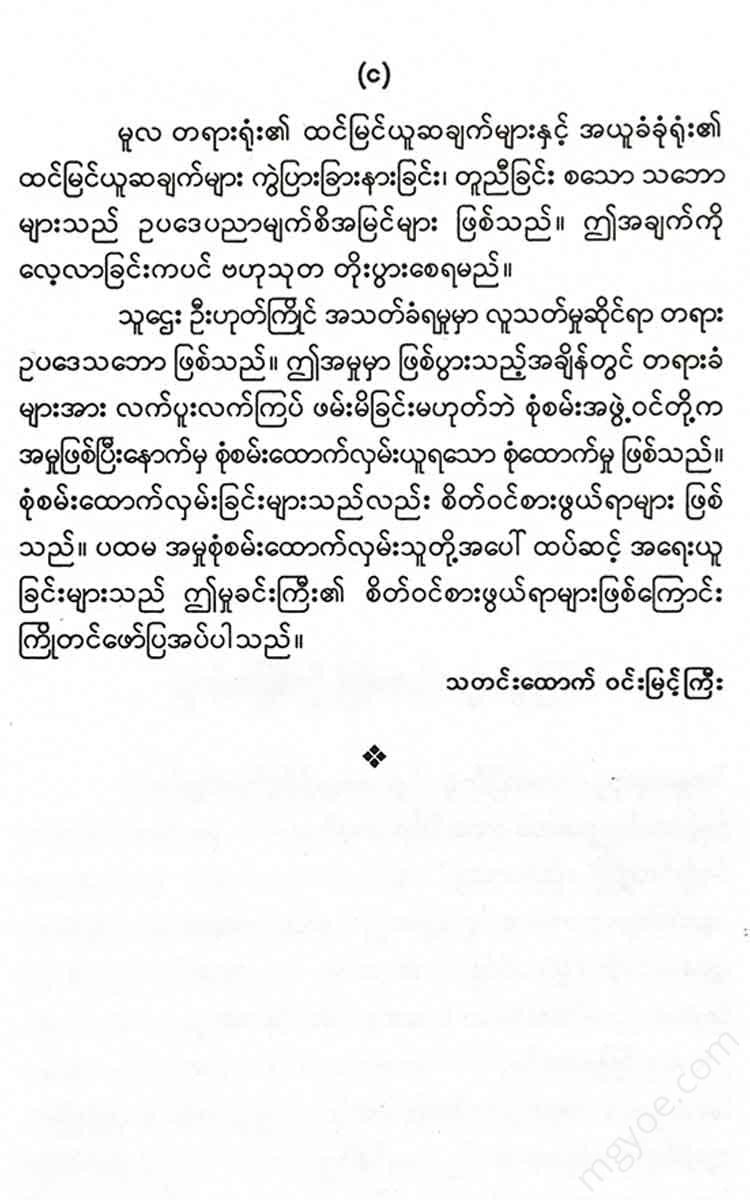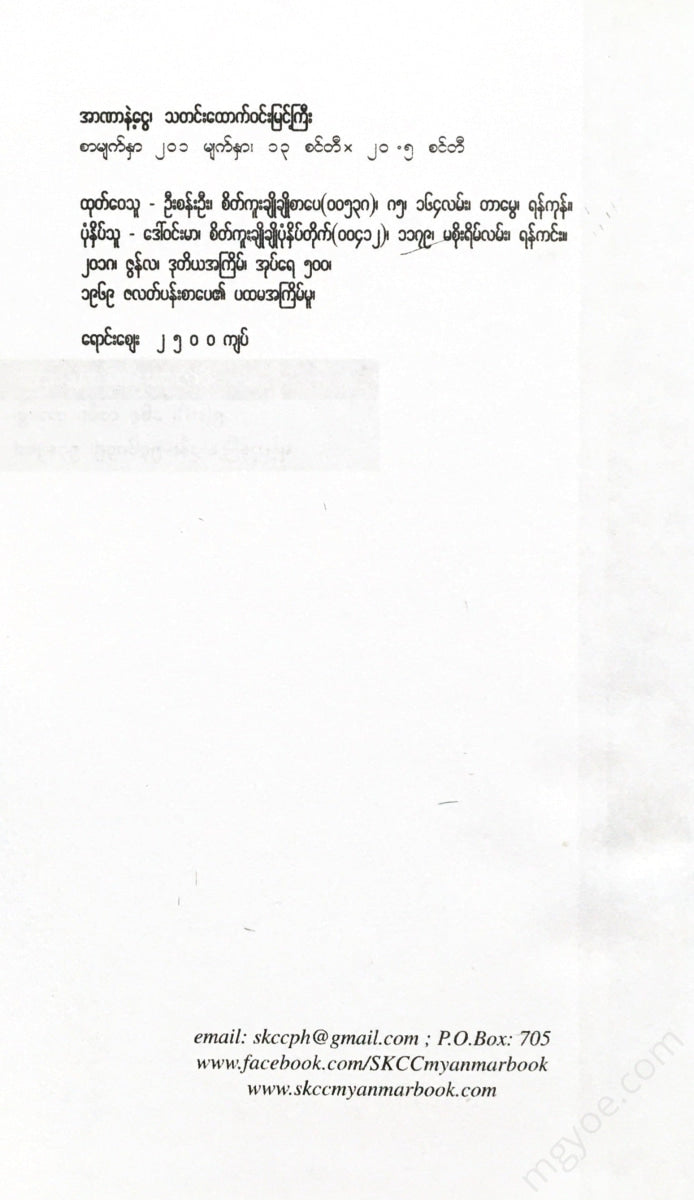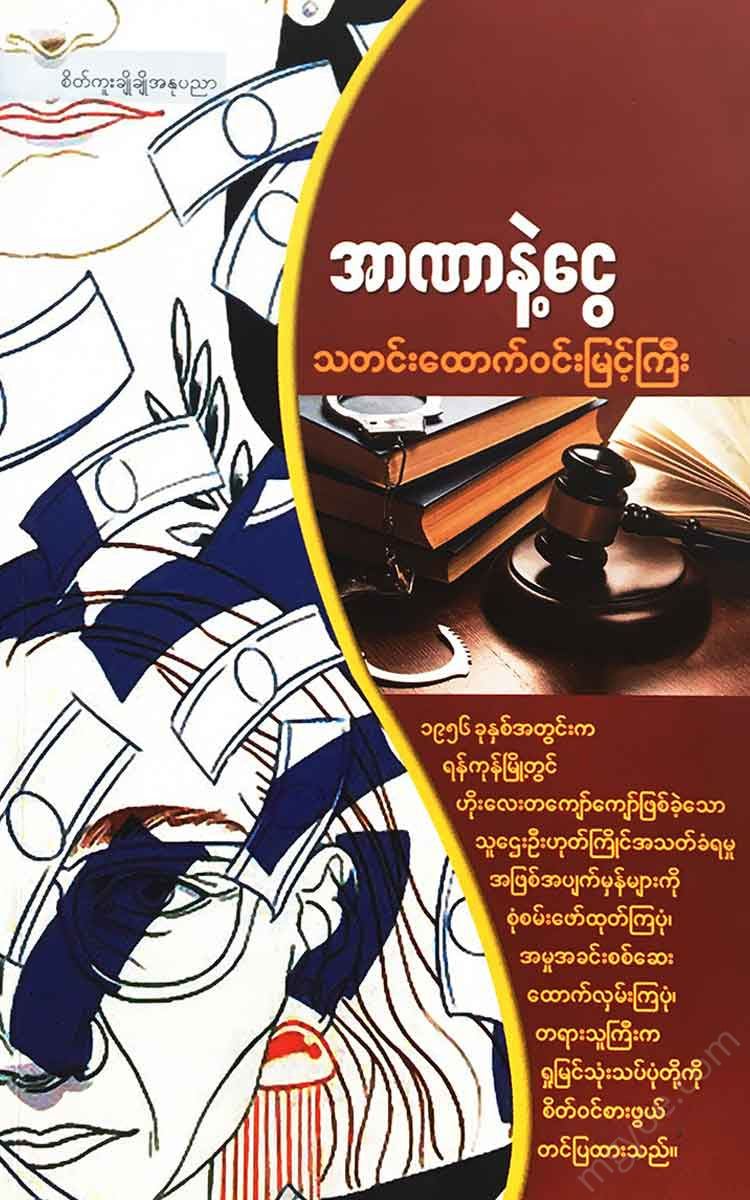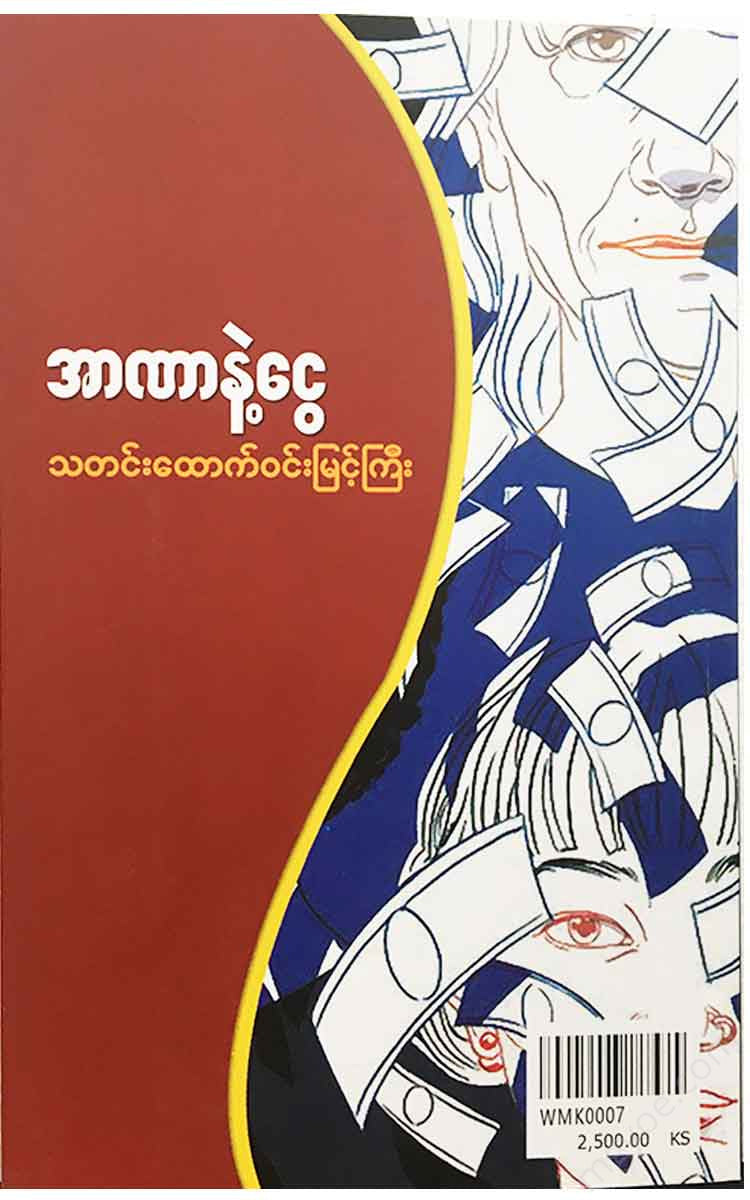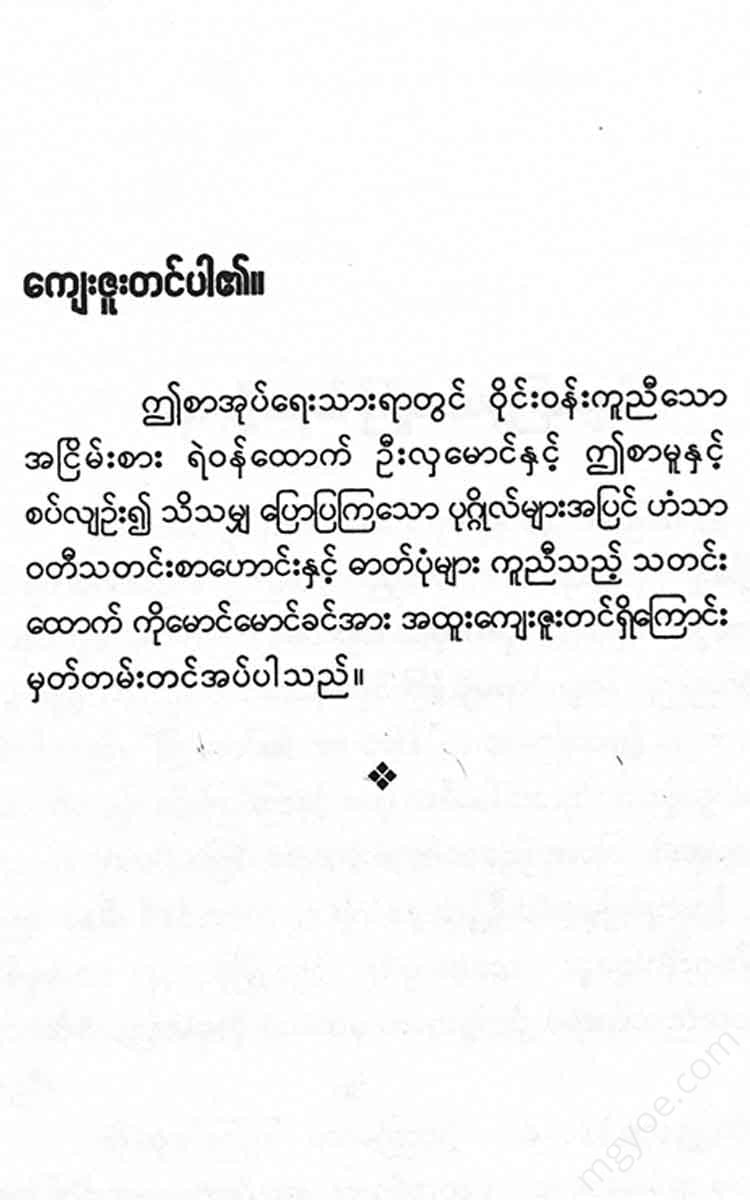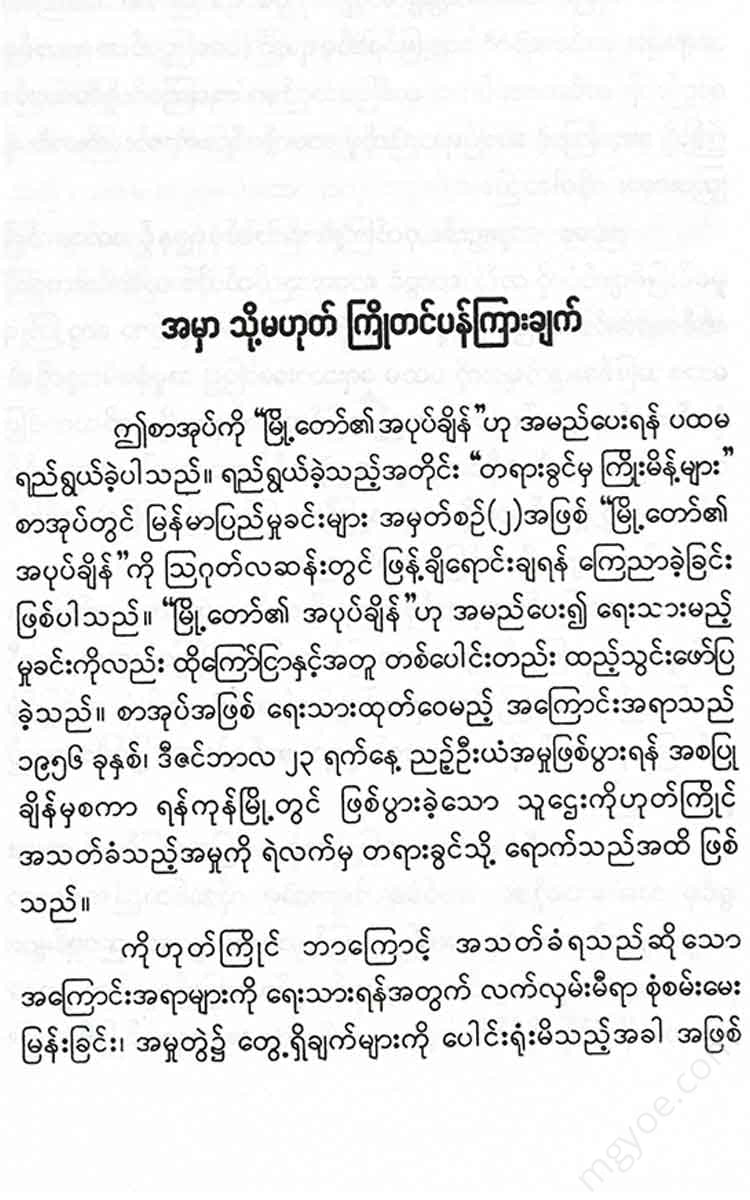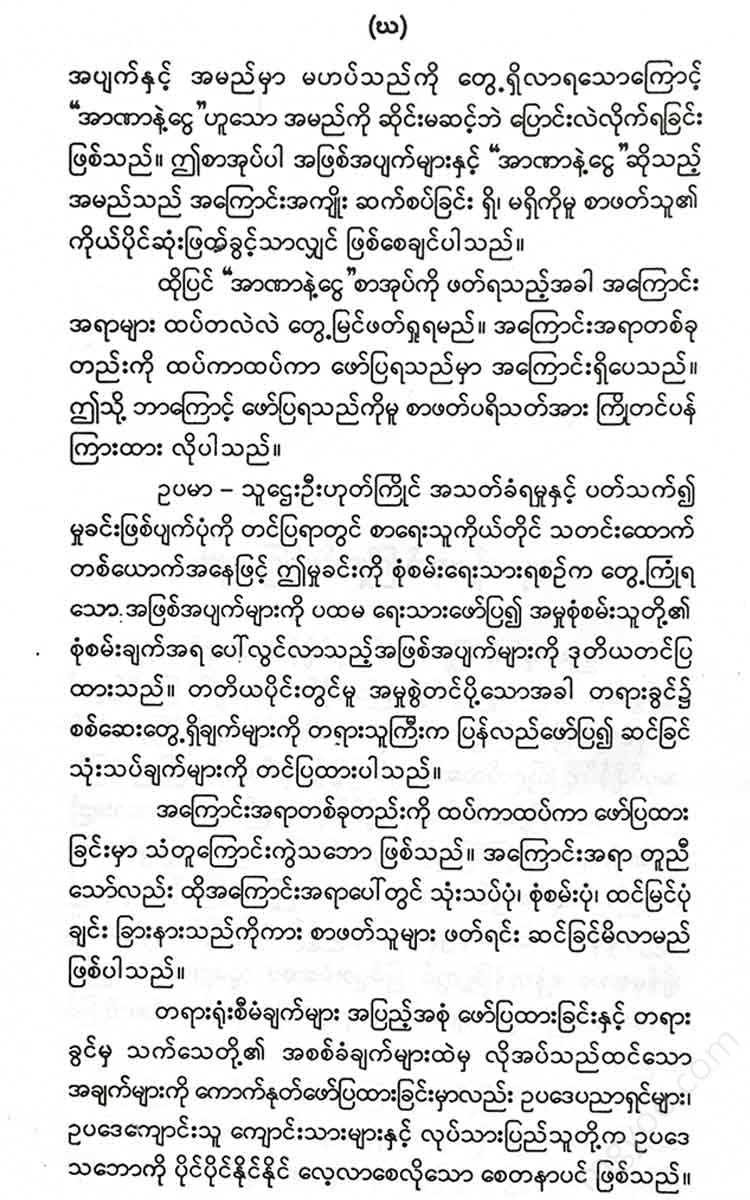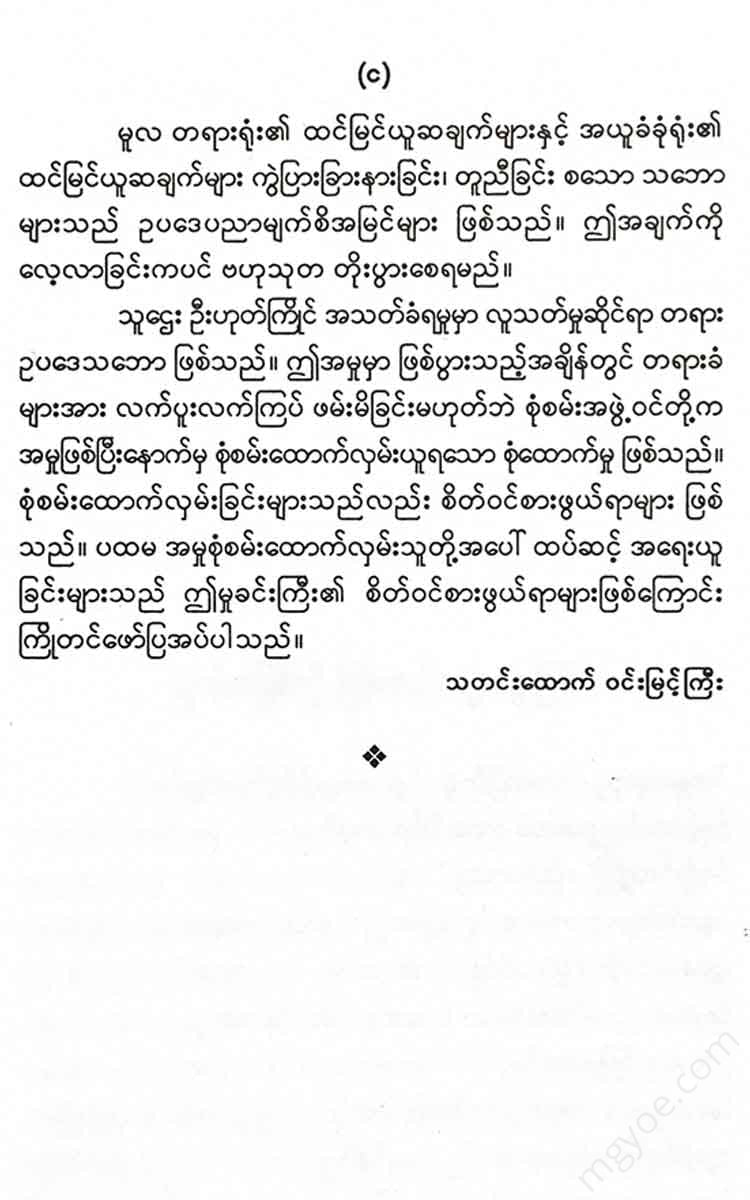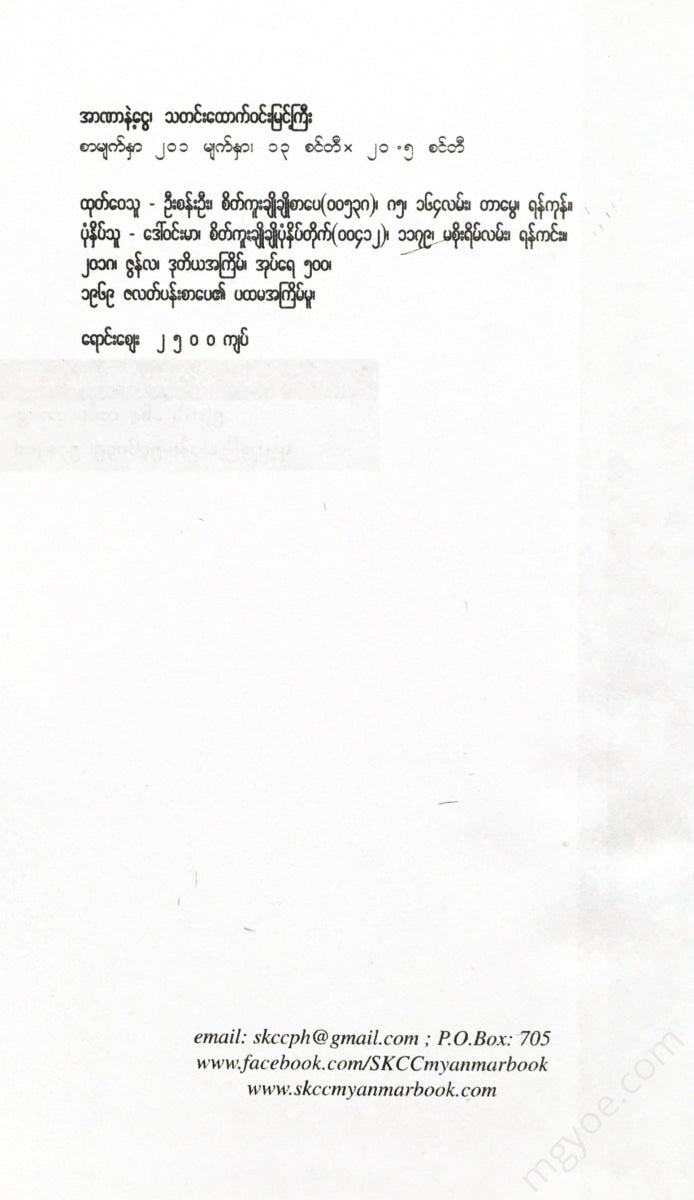စိတ်ကူးချိုချိုစာပေ
Reporter Win Myint Gyi - Power and Money
Reporter Win Myint Gyi - Power and Money
Couldn't load pickup availability
Discussing their views
After the release of the book, The Sentences from the Courtroom, I received warm comments from readers and discussions with close friends. I was happy to meet with comments and discussions when I was expecting criticism in advance. I think my own thoughts, ideas, and opinions are correct, but when readers criticize from various perspectives, I can reconsider my own ideas and thoughts. The events in The Sentences from the Courtroom and the criticisms of my ideas come from various perspectives. When I criticize the book as a whole, I focus on the fact that good and evil coexist.
It is important to accept that good and evil are opposites that coexist. When describing a topic, there will be both positive and negative people on that topic. It is the freedom of a person to criticize a problem or issue from their own perspective, and there is no reason to prohibit it. However, in order to discuss whether such criticism is right or wrong, the person who was originally criticized should have the right to explain it again.
All the criticisms and discussions will be presented together. Reading the book "The Courtroom Sentences" is attractive because the events are presented in a novel-like manner. Reading this allows people to acquire legal information. When a case is concluded, the reasons for the incident are revealed, which is educational for the readers. This is a criticism from one perspective.
Another criticism is that some legal provisions are seen as providing guidance to criminals. For example, the indirect, though not direct, statement that not all defendants should plead guilty is seen as providing guidance to criminals not to plead guilty.
Regarding the statement that beatings are morally and legally unacceptable acts in the investigation of a case, the critic is implying that if a criminal were interrogated by feeding him coconut rice and chicken, and with tea and bread and butter, this case would never have come to light.
Power and money
I do not need to discuss the first criticism in detail, but I would like to discuss the second point in detail. The idea that I expressed in the book "Orders from the Court" is based on the findings of the case. I would first like to mention a lecture given in a legal refresher course on how to properly defend a person arrested on suspicion of committing a crime.
The defendant's statement
The conviction under Section 164/364 of the Criminal Procedure Code is
Under Section 24 of the Evidence Act, the evidence was taken and according to that statement
The accused may be punished. Moreover, the evidence of his innocence
Under Section 300 of the Act, it can be considered in addition to other defendants.
However, the only correct answer is that the other defendants
It is said that he cannot be punished. (1958 Myanmar Supreme Court judgment)
Page 1. Aung Htun and the Union of Myanmar
Page 29, The Beauty of the Court and the Union of Myanmar
(Refers to the country) The defendants' statements are at least
Only a second-class judge with the authority to take a decision can do so.
A judge who has no authority to rule on justice.
Truth is not evidence. (1948, Myanmar)
(See page 49 of the ruling.)
In taking evidence, judges are to follow the procedure prescribed in Section 164/364 of the Code of Criminal Procedure. The evidence so taken is admissible in evidence under Section 80 of the Evidence Act. This means that the relevant evidence does not need to be submitted through the judge who took the evidence, but can be considered as evidence in the case file.
Article 24 states that threats and inducements are prohibited.
The defendant's statements, which were beyond expectation,
The court can use it against a defendant who confesses.
The defendant's justifications were threats,
Without temptation, the defendant automatically
The office can assume that it is a fair decision given according to its own will.
(1) To obtain justice without keeping the accused in custody for a long time.
(2) After giving a statement, the accused is not kept in police custody.
To send to prison or to keep in police custody
(See Article 404 of the Office Manual Law)
(3) After the arrest of the accused, they should be kept in solitary confinement.
They should not be kept together until they are properly restrained. If they are kept together,
The truth they give is ultimately the cause of the matter.
It can be said that the decision was made after consultation.
(4) When sent to the judge for clarification, the accused
You should send it separately.
(5) Whether or not the accused will be acquitted, the Code of Conduct section
When inspecting according to 162, it is necessary to inspect each person separately and each other.
To avoid knowing how to answer,
The purpose is to obtain a statement from the accused before charging them and taking them to trial.
Whether the defendant pleads guilty and then fails to appear in court or not
Even if they die after being charged, their righteousness is not lost.
Evidence is admitted under Section 32, Sub-Clause (3) of the Evidence Act.
That justification can be applied to other defendants and considered.
(See page 48 of the 1948 Myanmar Code of Conduct.)
The training is short and to the point, so you can easily understand the procedure for obtaining justice in accordance with the law.
When these statements, which are said to have been obtained in accordance with the provisions of the law, are brought to trial, the accused, under torture, tell the truth as they were taught by the police. They deny that they have given the statement and retract the statement. This practice in the courtroom is a tradition that has been observed in cases that have already been concluded.
In major cases, the police take the evidence from the judge. When the accused denies the evidence in court, they start to think and criticize the evidence. Legal experts have also said that they should consider whether it is suitable for this era.
When I met with a legal expert, he said that it is not a good idea to give a confession at the will of an ordinary person, but he expressed his opinion that a confession given by the police after being beaten and tortured is against police ethics and against the law. He also said that compared to other countries, Myanmar is still relatively easy to get a confession. In some countries in the world, the law states that a defendant can be punished for a confession he gives to the police, which is even worse.
Based on the facts of the cases that have occurred, the findings are presented. In some cases, the accused is caught red-handed (with eyewitnesses) and the evidence is available, making it easy to file charges. In such cases, the accused and the lawyers who are acting on behalf of the accused cannot get out of the case, and they can only evade the case by taking legal measures and reducing the case to a minor one. They try to evade.
In cases where the defendant did not remember the crime and the crime occurred in absentia, it is necessary to obtain a confession from the defendant (investigation) because it is a case where there are discrepancies in the witnesses, evidence, and statements of the defendant in order to make a charge.
In the first type of case, there is no point in dispute, but in the second type of case, the evidence and the defendant's claims are considered good and the claims are justified.
It is also possible to doubt that fair and unfair methods can be used to obtain justice. Therefore, it must be clarified that this is only a way for legal experts to consider what is right and just in this era by analyzing and criticizing the circumstances of the case, and is not a guide for those who commit crimes.
I would like to discuss the criticism that feeding a suspect with coconut rice and chicken soup, tea and bread and butter will not lead to a case being investigated. When the accused in cases of suspected cases, or the accused who are arrested and interrogated on a one-sided charge, deny that they have committed the crimes against them, beating and inflicting pain on the arrested person in order to investigate the case is not among the skills taught in the police academy, but we often read in the newspapers that some police officers are practicing this evil practice. There may be people who have been arrested without being reported.
Even beating the accused to solve the case only shows that the police officers are inferior. If a case is solved only by beating, it is not an acceptable practice according to the law, but rather an illegal one.
This is a copy of the Police Manual for researchers, which states how police officers and employees should treat someone who arrives at the police station.
Any police officer or employee in their custody
If you hurt someone "without reason"
And the officer was convicted by a criminal court.
Imprisonment of up to three months, or
Fine or both (or both)
Section 43 of the Police Act of 1945 provides that the
If such action is not taken, criminal charges may be filed.
Torture of prisoners who are unable to resist
This behavior is a derogatory act against the reputation of the police force.
The perpetrators should not be spared in any way.
No matter what level of torturer he is,
Whether serving or being permanently dismissed from office,
Punishment must continue, and those in custody must be held accountable.
By being harsh in supervision or
Even the slightest injury could tarnish the reputation of the police force.
The police officers and employees made special efforts to deal with the situation.
They must guard and protect (1380).
In this Act and in the Police Manual, it is found that both good and bad behavior are prohibited. However, in the Police Manual, in the prohibition against beating and torturing those who have been taken into custody, I noticed a phrase that is not left out. That phrase is the phrase “without reason.” Although the statement in the Police Manual clearly prohibits hurting those who have been taken into custody, I think that the phrase is likely to raise objections to that prohibition.
The phrase “without cause” implies that “if there is cause” the pain can be inflicted. What does “cause” mean? I think a precise definition should be given here. Why? In the same prohibition, 1380, the phrase “prisoners who are unable to resist” is also mentioned below. What cause can appear to a person who is unable to resist?
The fact that a person in police custody resists the police is a situation that should be seriously considered. A person who is in the hands of those who can easily and quickly turn them upside down should be seriously considered for obstructing or resisting the police without any reason. It is a separate issue that should be considered for those who resist during arrest.
The phrase "without cause" carries the meaning of allowing or permitting police officers to search and beat someone without cause for the case to arise. Therefore, it is necessary to clarify the meaning of the phrase precisely.
According to the Penal Code, it is clear. If someone hurts another person, regardless of whether they are an officer, employee, or civilian, they will be punished according to the extent of their actions.
